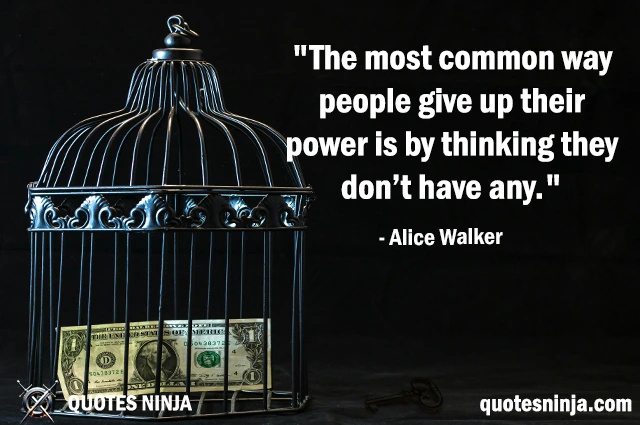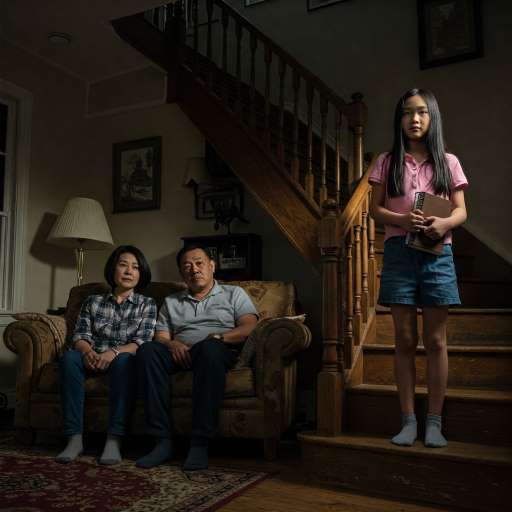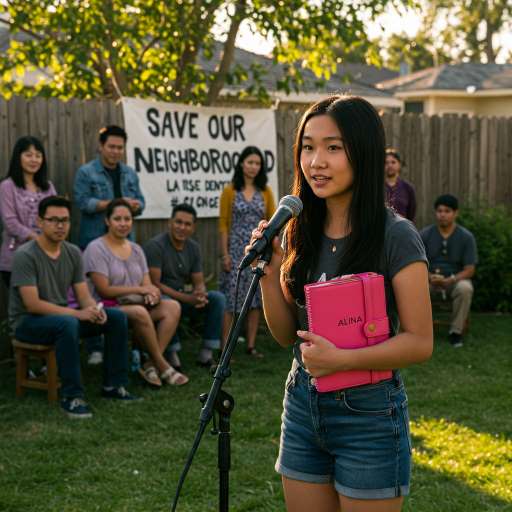
Power Quote: “The most common way people give up their power is by thinking they don’t have any.” attributed to Alice Walker, is an American novelist, short story writer, poet & activist.
Deeper Meaning of Power Quote
In this quote, Alice Walker highlights the idea that powerlessness is often a mindset, not a reality.
Here’s a breakdown of what it means:
- Perceived powerlessness: People often underestimate their ability to influence situations, make decisions, or change their lives. This belief alone can stop them from trying.
- Self-limiting beliefs: When someone thinks they don’t have power, they may not speak up, take action, or advocate for themselves—even when they actually do have the ability to make a difference.
- Surrendering by inaction: The quote suggests that the most frequent cause of lost power isn’t external oppression, but internal resignation. The moment you believe you’re powerless, you act accordingly—and that’s when real power is lost.
In essence, this quote is a reminder that awareness of your own strength, rights, and influence is crucial. Power doesn’t always come from titles or control—it often begins with belief in oneself.
Here’s a story inspired by Power Quote “The most common way people give up their power is by thinking they don’t have any.”
Power Story: “The Locked Door“
For as long as Maya could remember, the door at the end of the hallway remained locked.
It stood tall, painted in faded red, its brass knob untouched for years. Her grandmother once told her that behind it lay something dangerous, something not meant to be disturbed. So Maya obeyed, like everyone else in the household. Every morning, she passed it on the way to her chores, and every evening, she avoided its shadow.
But then, everything changed.
It started with a letter. A formal notice from the city’s planning department declared that the entire neighborhood—including their century-old house—would be demolished in six months to make room for luxury apartments. Maya’s parents panicked. Her father muttered about moving to a crowded apartment. Her mother clutched at her family heirlooms like lifelines.
Maya, however, couldn’t stop thinking about the locked door.

The Locked Door in the Hallway:
One evening, as the rain drummed against the roof and her family argued downstairs, she stood in front of it. She pressed her ear to the wood. Nothing. Then she whispered, “Why are you still locked?”
For the first time, she noticed something strange. The key to the door was already in the lock.
She blinked. Had it always been there? Why hadn’t she ever tried turning it?
Hesitantly, she gripped the cold metal and twisted. The knob creaked, then turned fully. The door swung open.

The Secret Room with the Journal:
Inside was a room flooded with golden light and covered in dust. Old trunks lined the walls, shelves sagged with books, and in the center stood a worn wooden desk with a leather-bound journal resting atop it. Maya stepped inside, her heartbeat quickening.
The journal belonged to her great-grandmother, Alina—a name barely whispered in family conversations. Maya flipped through the pages and uncovered a truth that shattered everything she thought she knew.
Alina had been an activist. A powerful one. She organized protests, helped neighbors fight eviction, and once led a legal case that blocked a corrupt land grab attempt in the very neighborhood where Maya now lived. The journal overflowed with plans, letters, blueprints, and ideas. Every page breathed defiance, courage, and hope.
Yet, there was no mention of why Alina’s story had been locked away.

Maya Holding the Journal, Confronting Her Parents:
Maya ran downstairs, the journal clutched to her chest. “Why didn’t anyone tell me about her?” she demanded.
Her mother paled. “She made life hard for all of us,” she whispered. “The government targeted our family. We lost jobs, friends. Eventually, we decided it was safer to forget her.”
“But she fought for this neighborhood. For people like us!” Maya argued. “We need this now more than ever.”
Her father sighed. “We’ve already lost, Maya. What can we do? We don’t have that kind of power.”
And there it was—that invisible cage. That quiet surrender passed down like an inheritance.
But Maya didn’t accept it.
She began with the journal. Night after night, she transcribed Alina’s words, digitized letters, and posted them on community forums. She joined local meetings, shared stories of resistance, and sparked a movement among neighbors who’d felt defeated. For every doubter, she found someone willing to believe again.
Next, she contacted the city archives. With persistence, she uncovered paperwork that revealed irregularities in the development plan—evidence Alina had once helped expose decades before. Maya reached out to a local nonprofit that offered legal aid. They took up the case.
Still, resistance came hard and fast. Developers offered buyouts. Friends cautioned her to back down. Even her parents urged her to let it go. But each time doubt crept in, Maya would remember the locked door—and how easily it had opened when she believed she had the right to try.

Maya Speaking at a Community Gathering:
Then, two months before the scheduled demolition, the city issued a temporary halt. The legal investigation found grounds to challenge the development based on community rights and historical significance. Maya stood before a crowd of reporters and neighbors, holding Alina’s journal in one hand and a microphone in the other.
“We were told we had no power,” she said. “But that wasn’t true. We only gave it up because we thought we had none. That ends today.”
Applause erupted. People cheered not just for Maya, but for themselves. They had begun to believe again.

The Door Now Open with Light Pouring Out:
Eventually, the neighborhood was preserved. Maya’s efforts earned her a scholarship to study law. She planned to fight for communities like hers—ones so often taught to forget their strength.
And yet, what mattered more than the outcome was the transformation.
Where once there had been fear, now stood courage.
Where there had been silence, now rang a voice.
And where a locked door had long symbolized limits, now lived the memory of a girl who turned the key.
Here is the ending of power story from the quote “The most common way people give up their power is by thinking they don’t have any.”
Moral of the Story:
We often surrender not because we are powerless, but because we’ve been taught to doubt the power we hold. The key is within reach, we only need the courage to turn it.
To explore more on stories and dive into related ideas, be sure to check out the other posts where we cover all sort of stories related to quotes. Stay tuned for more…..
To explore more on quote topics, be sure to check out the other topics where we cover all categories of quotes. Stay tuned for more…..

